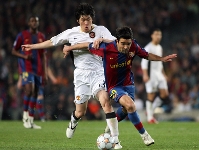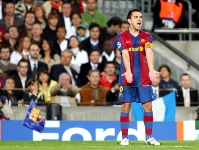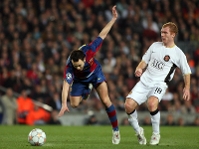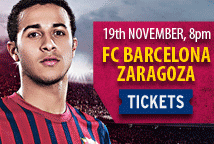FCBARCELONA.CAT
Main menu

Content menu
Football
28.04.2008 17:11
Ball possession: to be or not to be
Marc Guillén
Tomorrow’s game will be between one team, Barça, which bases its game plan on retaining the ball and ManU which “needs” to have the ball and has recently been losing it. Ball possession could therefore be one of the key factors in the semi-final.
The semi-final of the Champions League might be decided by small incidents, but the side that can impose their style on the game will be halfway to winning and to do that you have to have the ball. Ferguson said it was a key factor after the game at Camp Nou: “We’re a bit disappointed by the way we moved from defence into attack. That was our big problem or thing we need to improve.”
Aggression and Old Trafford’s size
 United’s coach is very much aware that possession is
one of his side’s strengths and that they need to get it back in order to beat Barça.
“I think we know why it’s happening so I hope to have solved it by Tuesday. We have to
be more aggressive when we have the ball,” he said after last Saturday’s game against
Chelsea (2-1).
United’s coach is very much aware that possession is
one of his side’s strengths and that they need to get it back in order to beat Barça.
“I think we know why it’s happening so I hope to have solved it by Tuesday. We have to
be more aggressive when we have the ball,” he said after last Saturday’s game against
Chelsea (2-1).
An important thing about holding onto the ball is having space, which means the size of the field can affect the way a team plays. People who’ve played on both pitches say that the one at Old Trafford is smaller but that must be just an impression as the official figures say it is actually a little bigger than the Camp Nou playing surface (Old Trafford measures 106x69 and the Camp Nou, 105x68).
Manchester United have lost possession in recent games
In the first leg of the Champions League semi-final at Camp Nou, Barça had 69% ball possession against United’s 31%. Although not reflected in the final score, the Catalans superiority was obvious as can be seen from their seven shots on target as opposed to the one by the Mancunians.
United’s last game was against Chelsea and the Red Devils lost 2-1 in a game in which they also had less time in control of the ball (53% possession for Chelsea and 47% for Manchester United) and created fewer chances (five shots for Chelsea and one for Manchester United).
More midfielders in the line-ups
 “Barça always tries to get control of midfield and
that makes life harder for their opponents,” says Ferguson. In the first leg both sides had
an extra midfielder on the pitch, with Iniesta playing upfront for Barça and Hargreaves playing at
right-back for Manchester United.
“Barça always tries to get control of midfield and
that makes life harder for their opponents,” says Ferguson. In the first leg both sides had
an extra midfielder on the pitch, with Iniesta playing upfront for Barça and Hargreaves playing at
right-back for Manchester United.
The Dream Team lesson
On 2 November 1994, Barça beat Manchester United 4-0. The Catalans dominated the game from start to finish with players constantly seeking space to create passing opportunities. “That game was big lesson for me, as I learnt the significance of keeping hold of the ball. Until then I hadn’t really got it. It showed me how important having the ball is in European competitions,” commented Sir Alex last week. “In fact I would even say that the reason we won our quarter-final match this season in Rome was because of what we learned that day.”

What’s the point of retaining possession of the ball?
As long as you can move the ball around at speed in your opponent’s half of the field, you
can make gaps in their defence and create chances and keep them pinned back in their own half. If
your rival has to spend a lot of the match defending, they get much more tired and find it hard to
attack as when they do get the ball they are a long way from your goal. As Ferguson has noted,
Barça are specialists in this: “Controlling the ball has been their strength for years now
and it’s what’s made them so strong.”



